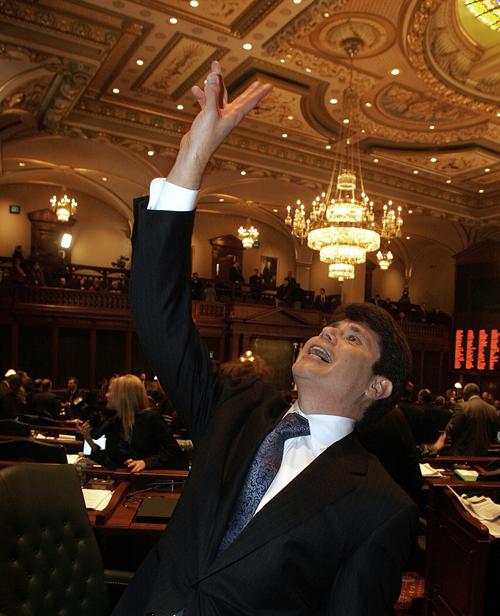Lawmakers find flaws in governor’s spending plan
Illinois Gov. Rod Blagojevich waves to supporters after delivering his State of the State Address to a joint session of the General Assembly in Springfield, Ill., Wednesday. Seth Perlman, The Associated Press
February 21, 2008
SPRINGFIELD, Ill. – Gov. Rod Blagojevich offered a long list of ideas for Illinois residents in a remarkably short speech Wednesday: tax breaks for families and businesses, a major state construction program, big savings in long-term state debt.
Just as quickly, Democratic and Republican lawmakers listed flaws in the governor’s State of the State address, promising to strongly consider alternatives to accomplish many of the same goals.
With state government facing a budget crunch, Blagojevich relied on a series of recycled money-raising ideas to put together his spending plan for next year. The list of repeats includes raising casino taxes, privatizing the state lottery and imposing a business tax to pay for health care.
The Democratic governor also proposed across-the-board cuts of 3 percent at many agencies, with some facing even deeper cuts. The Department of Natural Resources would get a 40 percent cut in state funds, for example.
“To give families and businesses more of their money back, we have to cut spending,” he said in a speech that lasted barely 22 minutes. “If we manage our budget in tough but clear-eyed ways, we can move, and move quickly, on strengthening our economy.”
Get The Daily Illini in your inbox!
Legislators complained that many of his ideas, both for spending money and raising it, have been rejected before. They’re even less likely to succeed this time, many said, after last year’s session that took gridlock to history-setting levels.
“He just doesn’t want to stand up to reality,” said Sen. Bill Brady, R-Bloomington. “He’s got no real solutions to Illinois’ problems.”
Blagojevich received only a smattering of applause as he entered the House chamber, and he was interrupted by applause just a handful of times – including once by some of his top aides. The biggest support came for his mention of Barack Obama’s campaign for president.
Senate Minority Leader Frank Watson and others said that signaled Blagojevich will have major problems trying to get his agenda approved this year.
“There’s so much unsaid about this budget,” said Watson, R-Greenville. “There’s a lot of unanswered questions.”
Blagojevich’s spending plan would increase general state spending to $49.7 billion, up 3.9 percent from the current level. In addition, the state spends billions of dollars a year on road repairs and other capital needs, bringing the total to about $58 billion, the governor said.
The centerpiece of Blagojevich’s speech was a $1.2 billion economic stimulus package.
It would feature a one-time credit of $300 per child for about 1.3 million Illinois families – following up on the federal checks families are in line for this spring – and give businesses who pay state corporate income taxes a 20 percent credit.
“When times are tough, I believe the best way to fight for families and fight for people is to focus on strengthening the economy,” he said.
The governor suggests paying for that package through “securitization”: selling off future revenues from a yearly money stream, such as money from a nationwide settlement of tobacco lawsuits, in exchange for a big check today.
That idea has been discussed before but never went anywhere in Springfield.
Both Republicans and business groups said the state would be wiser not to provide such breaks when the budget is already ailing.
“He’s once again playing Santa Claus trying to give away billions of dollars worth of tax relief that, quite frankly, the state doesn’t have,” said Doug Whitley, president of the Illinois Chamber of Commerce.
Blagojevich called again for increasing health care insurance coverage, although not as dramatically as his universal health care plan from last year. He suggested paying for it through a $417 million payroll tax on some businesses – another repeat idea that went nowhere.
The governor also proposed selling off much of the rights to running the state lottery to get $7 billion this year. Revenue from that idea, which lawmakers rejected last year, largely would go to help pay for an $11 billion statewide construction program but also would provide aid for schools and other budget expenses.
His plan would send just $300 million more to schools next year, after a $560 million boost a year ago. But Senate President Emil Jones, D-Chicago, indicated that amount could grow significantly if lawmakers get behind a long-debated idea to increase state income taxes – which Blagojevich adamantly opposes.
Blagojevich proposed refinancing $16 billion in state pension debt to take advantage of lower interest rates and save the state more than $50 billion in pension costs over the next several decades. A similar idea passed in 2003, and top leaders indicated they might support it again.
The governor trotted out a plan to raise riverboat casino taxes and bring in hundreds of millions of dollars by selling off the long-defunct 10th riverboat license.
And he again urged legislators to end some tax breaks for businesses and sweep money out of some special funds to help close a $750 million gap in the current year’s budget.
Just how seriously these proposals will be taken by lawmakers is uncertain. Some said the governor can improve those chances if he commits to working with legislators rather than fighting them.
House Speaker Michael Madigan, Blagojevich’s main nemesis over the last year, indicated his members will start work soon on their own spending plan to “avoid a repeat of the 2007 budget debacle.”
Jones said he supports many of the governor’s ideas, even if they have been turned down before, but predicts a solution to the state’s problems only if all the leaders are committed to reaching one.
“You cannot sit back and chop holes in everything one attempts to do and then say you want to get out of here early,” Jones said. “That takes cooperation.”







